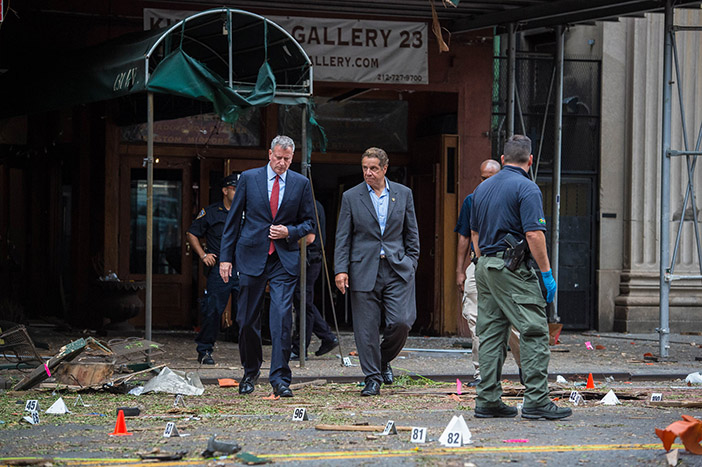Photo Courtesy of Michael Appleton/Mayoral Photography Office
In the wake of recent terror attacks in Manhattan (pictured) and New Jersey, Sen. Schumer has urged the U.S. Nuclear Regulatory Commission to overhaul its nuclear licensing protocol.
By Forum Staff
U.S. Sen. Charles Schumer (D-N.Y.) this week urged the U.S. Nuclear Regulatory Commission to overhaul its nuclear licensing protocol, which Schumer characterized as being riddled with loopholes that allow wrongdoers to legally obtain radioactive materials that can be used to develop a dirty bomb.
Additionally, New York’s senior senator cited a recent “shocking” Government Accountability Office report in which a fictitious shell company successfully obtained a license that allowed them to purchase enough materials to construct a radioactive explosive device.
“It is simply shocking that in a post 9/11 world, where we are faced with metastasizing homegrown terror threats, creating a shell company and collecting radioactive material is made possible through the U.S. government’s own policies and procedures,” Schumer said. “We must adapt and fix our weaknesses, even as the terrorists who seek to do us harm are adapting to our efforts to root out and destroy them in other parts of the world. The fact that the NRC has oversight over this shocking loophole is something they must swiftly address before a nefarious attempt is made. The GAO did the right thing by exposing this ‘dirty bomb’ secret, and now we must finish the job by closing this loophole, while scouring the list of just who is being granted access to these dangerous materials.”
Schumer added that, in light of the GAO report, the increased prevalence of homegrown terror threats, and the recent attacks in Manhattan and New Jersey, the feds should scour the list of newly-approved shipments of radioactive material to make sure that all those who were granted a recent license are legitimate.
“The bottom line is that we must have a rigorous background-check system in place for any entity that seeks to purchase radioactive material, and an equally rigorous system for tracking what they do with it afterwards,” Schumer said. “In an age of terror threats, purchasing radioactive material is not just a medical matter or research matter, it is a national security matter, too.”
According to Schumer, There are three categories of radioactive material that range in descending order of danger: Category 1, Category 2, and Category 3. Despite the three levels of danger, each category could cause permanent injury to a person handling the radioactive material or in a city where it might be deployed as part of a dirty bomb. Unlike the process for obtaining a license for category 1 and 2 radioactive materials, the NRC does not review specific security measures before a Category 3 license is issued. Schumer said that this is “a highly concerning loophole” because a malicious individual may be able to obtain enough Category 3 radioactive materials to create and detonate a deadly dirty bomb capable of poisoning a major city like New York. According to the National Resources Defense Council, Category 3 radioactive material poses serious exposure risks to humans.
In its July study, the GAO established three fictitious businesses – including the leasing of vacant space for each fictitious company – and applied for a Category 3 radioactive materials license for each. In one of the three scenarios, GAO successfully obtained a license and secured commitments to purchase Category 3 radioactive material that could be used to develop a dirty bomb.

